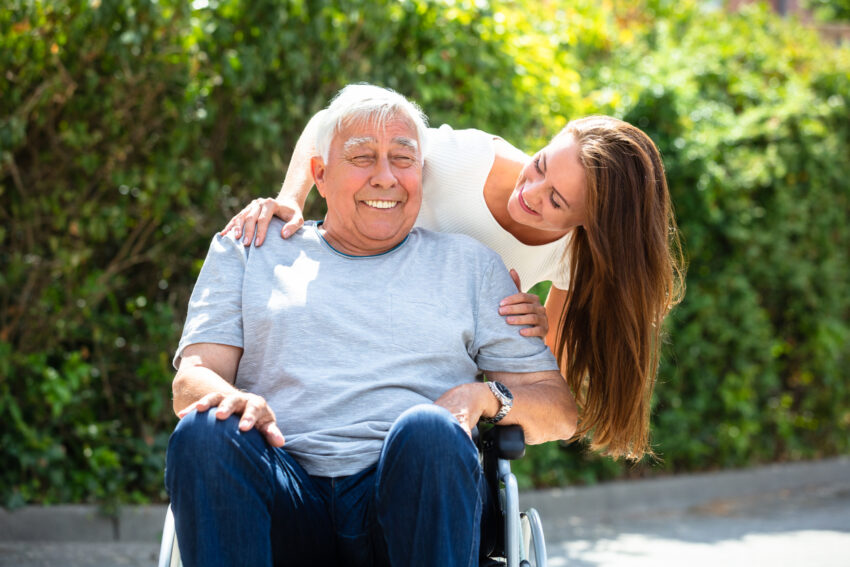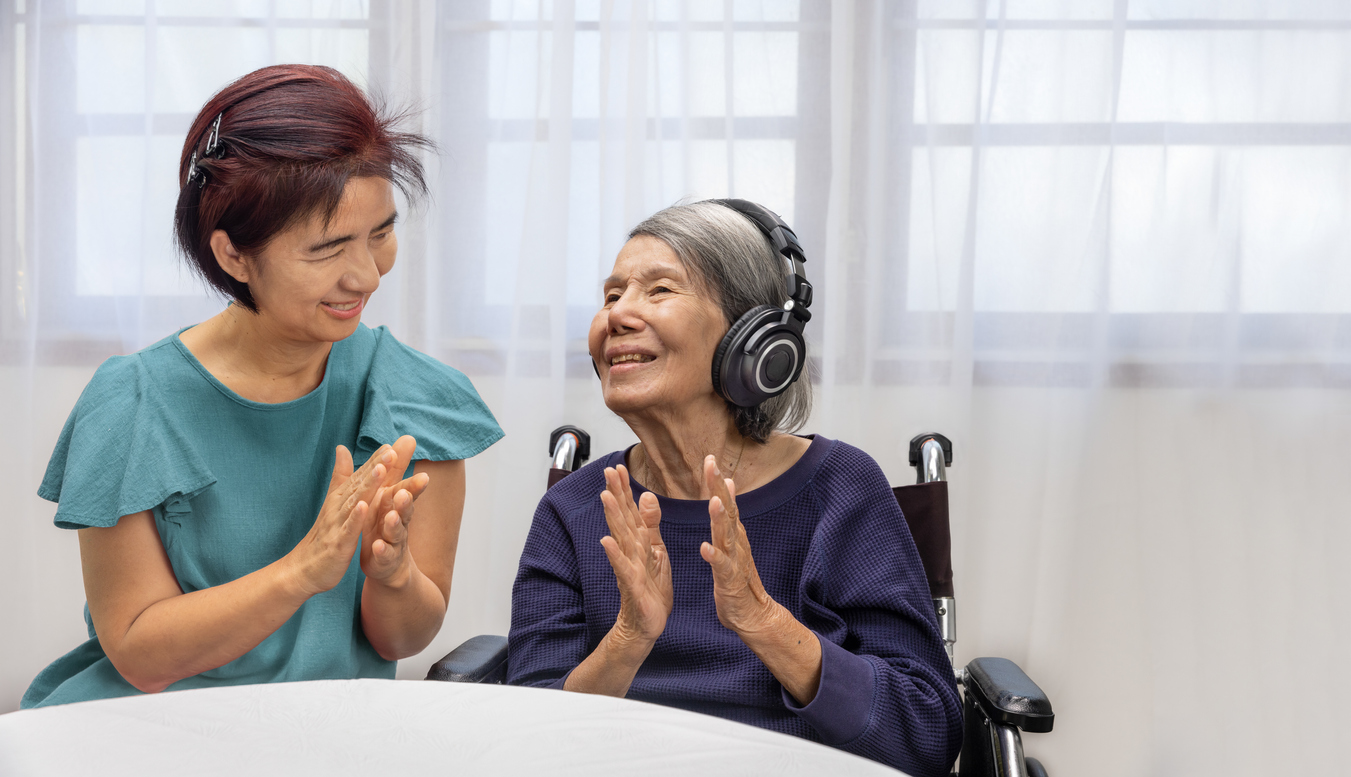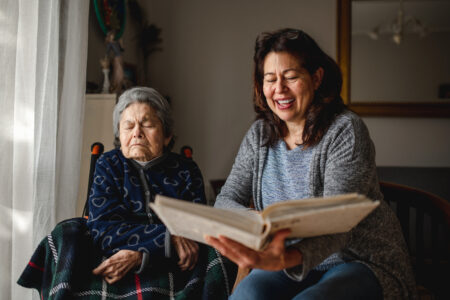
Share On Social!
Over 11 million Americans provide unpaid care for people with Alzheimer’s or other dementias.
Of those caregivers, about 25% are Latino.
Many Latinos are “sandwich generation” caregivers — meaning that they care for an aging parent and at least one child.
While caring for aging family members can be rewarding and feel like the right thing to do, caregiving is a full-time job that can be physically, mentally, and emotionally taxing.
That’s why we’re highlighting 15 resources to help San Antonio and South Texas Alzheimer’s caregivers navigate caregiving challenges. Check out the list below, and feel free to share these resources with other caregivers.
Caring for the Caregiver at UT Health San Antonio
If you live in or near San Antonio, the Caring for the Caregiver program at UT Health San Antonio offers a variety of engaging resources to help caregivers relieve stress, socialize, and learn new coping and caregiving skills. These resources include:
- Caregiver Telephone Reassurance Program: Caregivers are paired with a UT Health San Antonio student to connect via phone over a period of 3-6 months. Students learn from caregivers about caregiving challenges, and caregivers relieve stress by socializing with compassionate students. All students are trained to support caregivers in finding resources they may need. Contact the program!
- Memory Cafés: Memory cafés are a safe space for caregivers and people living with dementia to laugh, learn, and socialize with others living similar experiences. Cafés are hosted online monthly and in-person quarterly. Attend the next Memory Café event!
- Grace Place Center: Temporarily closed but set to reopen in late 2023, Grace Place is an adult activity center that supports caregivers through monthly support groups, caregiver resources, at-home activity packets, and a program called Grace Notes, described below. Learn more about Grace Place Center!
- Grace Notes Community Singers: Grace Notes is for people living with dementia and their families, including their caregivers. The choir is led by a board-certified music therapist and no experience is necessary to join. The choir meets weekly in a hybrid format. For more information, contact Amy Standridge at amy@oaksongmusictherapy.com, (512) 567-1432 or (210) 692-4259.

- Second Wind Dreams® Virtual Dementia Tour®: The virtual dementia tour gives caregivers and others the experience of living with dementia. This experience can help foster deeper compassion among caregivers. Learn more about this program by contacting the Caring for the Caregiver program.
- Learning Skills Together Workshops: These workshops provide caregivers with practical skills and hands-on training in home safety, dental hygiene, nutrition, and medication management. Contact UTcaregivers@UTHealthSA.org for more information!
- The Essentials of Caregiving Classes: These classes provide caregivers support in several areas, including what to expect after a dementia diagnosis and how to plan for your loved one’s finances as they age. Learn more about the classes!
- Dementia Friendly San Antonio: This program offers workshops to teach people, including caregivers, about dementia, how to recognize it, how to communicate with somebody who has it, and how to support people living with dementia in our community. Get involved in Dementia Friendly San Antonio!
- Biggs Institute Recollections Museum Visits: Looking to get your loved one with dementia out of the house? Caregivers with an artsy side will appreciate the Recollections program. This dementia-friendly activity is led by trained museum staff that encourage reminiscing inspired by works of art. Attendees will then create their own masterpieces while enjoying a free lunch. Attend the next Recollections event!
- Biggs Institute Counseling: Melissa Flores, LPC and counseling and community programs coordinator at the Biggs Institute, knows that dementia can take an emotional toll on patients and caregivers. That’s why she provides a variety of counseling services, including individual, couple, and family therapy. For more information or to schedule an appointment, contact Melissa Flores at 210-450-8506.
City of San Antonio Caregiver Resources
The City of San Antonio is dedicated to supporting caregivers and making sure they take time for themselves. Here are a few programs the city has to offer:
- The Alzheimer’s Association San Antonio and South Texas Chapter: This local chapter of the Alzheimer’s Association offers support groups, educational programs, individualized planning provided by licensed professionals, and community resource lists for caregivers and people living with dementia. It also operates a 24-hour toll-free Helpline. Join the chapter!
- San Antonio Area Foundation Successfully Aging and Living in San Antonio (SALSA) Initiative Family Caregiver Toolkit: This toolkit covers everything you need to know about caregiving and how to take care of yourself as a caregiver. Read the toolkit in English and Spanish!
- WellMed Charitable Foundation Caregiver Support: Headquartered in San Antonio, the WellMed Charitable Foundation offers caregiver coaching, education, and stress-busting techniques through their Caregiver Support program. Learn more!
Texas Caregiver Resources
Everything is bigger in Texas – including support for caregivers. Check out these resources to find support near you.
- Texas Department of Health and Human Services: When caregivers need a helping hand, this website has them covered. Explore a variety of resources and services the state has to offer, including in-home care and personal attendant services, medication management, and transportation and meal services. Learn more.
- AARP Family Caregiver Resources for Texans: This caregiver guide serves as an informative starting point to help caregivers find the services and support they need in the Lone Star State. Resources include online support groups, links to local respite care, and how to support caregivers in the workplace. Explore these resources.
You Have a Voice for Health Equity
 Older adults – especially Latino seniors – face a variety of health disparities, including disproportionate rates of disability, Alzheimer’s, cancer, and more.
Older adults – especially Latino seniors – face a variety of health disparities, including disproportionate rates of disability, Alzheimer’s, cancer, and more.
This can put a strain on their caregivers, who are often family members.
You can speak up for health equity among our nation’s seniors, especially those in black and brown communities.
Select your county and get a Health Equity Report Card by Salud America! at UT Health San Antonio.
In your report card, you will see maps, data, and gauges to compare health equity issues, including healthcare access and income level, to the rest of your state and nation.
You can email your Health Equity Report Card to local leaders to stimulate community change. Use the data in your materials or share on social media to raise awareness.
Get your Health Equity Report Card!
Explore More:
DementiaBy The Numbers
142
Percent
Expected rise in Latino cancer cases in coming years



